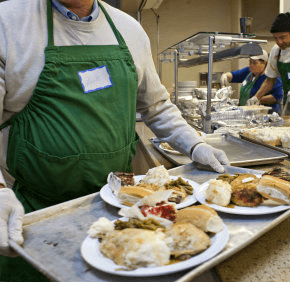By Maria Wiering
mwiering@CatholicReview.org
Maryland’s Catholic bishops released a joint statement Jan. 20 urging fair treatment of workers. The statement coincides with Poverty Awareness Month and the state’s legislative session, where increasing the minimum wage and mandating paid sick leave for low-wage workers are already in the spotlight.
The bishops make clear they want Maryland to enact legislation promoting “just compensation and a healthy work environment.” “While we hope one day the issue of raising the minimum wage will be addressed at the federal level, we cannot afford to wait in Maryland,” they stated.
Titled “The Dignity of Work,” the one-page statement was released in English and Spanish. The following are five points Catholics can take from the piece.
1. The church’s call for a living wage is nothing new. “Throughout the history of the social teachings of the Church, the right of all people to fair compensation for their labor has been upheld as an essential element of a just society,” the bishops stated. In “Rerum Novarum,” published in 1891 and considered the first of the modern social encyclicals, Pope Leo XIII argued that workers should be paid a wage sufficient to support a family, according to the bishops’ statement.
2. Minimum wage is not a living wage. “A full-time worker earning the state’s minimum wage of $7.25 earns little more than $15,000 annually, hardly enough to pay for food and rent, let alone support a family,” the bishops stated, adding that more 80 percent of the state’s low-wage workers are adults, many with children. “They deserve the comfort of knowing that their hard work can provide the means they need to achieve economic stability for themselves and their families.”
3. Wages aren’t the only place where the workplace should improve. “The majority of Maryland’s low-wage workers have no access to paid sick leave, leaving them to choose between coming to work sick or losing a day’s wage,” the bishops stated. “It is in the best interest of all to enact reasonable policies that keep our workplaces healthy by allowing workers to stay home when they or their dependent family members are sick, without due penalties.”
4. The local Catholic Church sees the effects of poverty up close. “As the state’s largest private social service provider, we witness in our Catholic ministries the painful reality of those who struggle to keep up with the basic costs of food, rent, utilities and transportation,” the bishops state. “This desperate cycle cannot end unless we as a society find a way to give all capable men and women the chance to work at a job through which they can live with true independence and dignity.”
5. Pope Francis is on board. “The Dignity of Work” opens and closes with quotes from the current pope. The opener is from “The Joy of the Gospel,” Pope Francis’ 2013 apostolic exhortation: “It is through free, creative, participatory and mutually supportive labor that human beings express and enhance the dignity of their lives. A just wage enables them to have adequate access to all the other goods which are destined for our common use.” The statement’s second-to-last line is also from Pope Francis: “The dignity of each human person and the pursuit of the common good are concerns which ought to shape all economic policies.”
“As Pope Francis continues to captivate the world through his powerful challenges to care for the least among us, he frequently echoes his predecessors in highlighting the importance of providing opportunities for meaningful work as a path out of poverty,” the bishops stated.
The bishops released the statement through the Maryland Catholic Conference, which advocates for public policy on their behalf. Archbishop William E. Lori of Baltimore is the MCC’s chairman. Other members of its board of governors are: Auxiliary Bishop Mitchell T. Rozanski of Baltimore, Auxiliary Bishop Denis J. Madden of Baltimore, Bishop W. Francis Malooly of Wilmington, Cardinal Donald Wuerl of Washington, Auxiliary Bishop Francisco Gonzalez of Washington, Auxiliary Bishop Martin D. Holley of Washington and Auxiliary Bishop Barry C. Knestout of Washington.
Also see:


